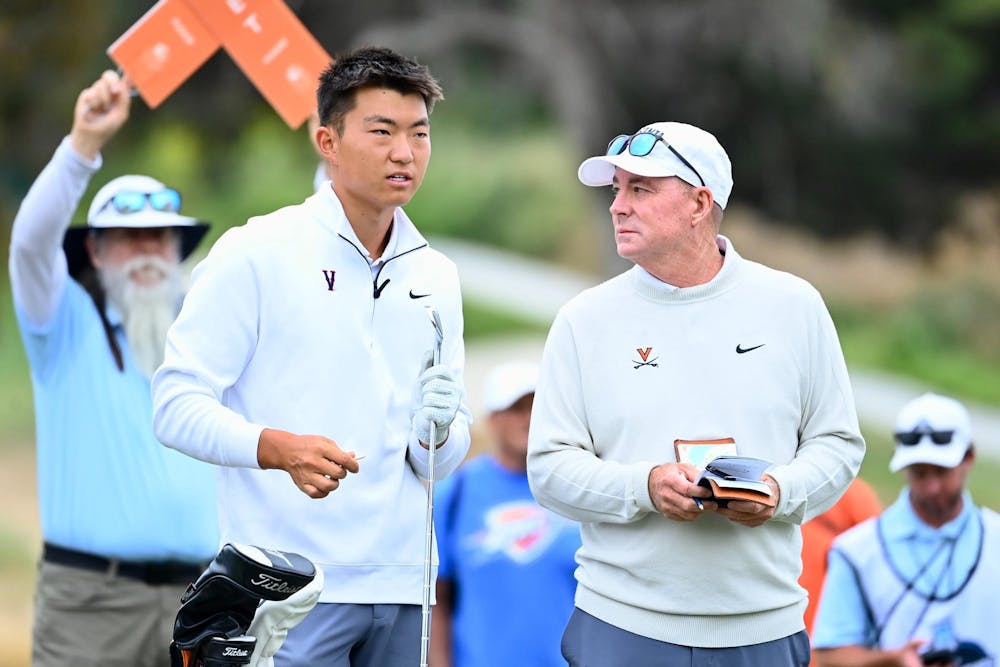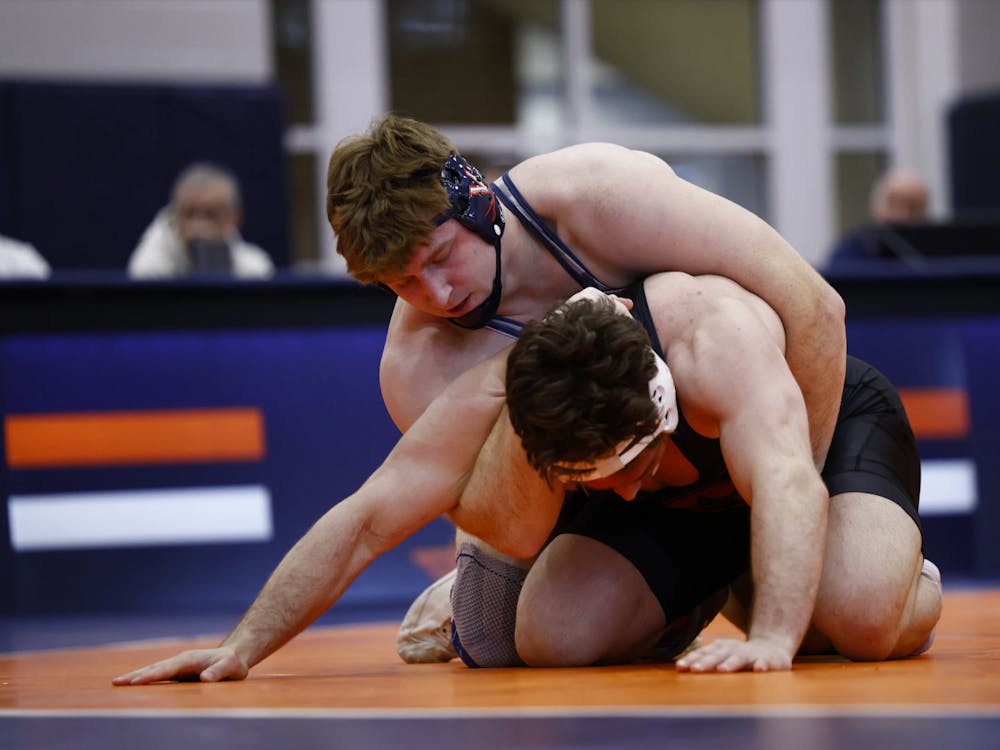Virginia not only got its first ever win in NCAA Championship match play this week — it also got its second, giving it a chance to win a national title Wednesday. On the way there, the Cavaliers not only defeated the Florida team that beat them two years ago on the way to a national title, but also defeated the Auburn team that beat them last season on the way to its own national title.
Virginia’s run ended in the championship match, though, after it lost the lead on the back nine against Oklahoma State in a 4-1 defeat at the Omni La Costa Resort & Spa in Carlsbad, Calif. The Cowboys, already 11-time national champions, walked away with their twelfth, while the Cavaliers walked away without the final hardware but with the most successful season in program history, national runners-up and ACC Championship champions.
“That’s a heck of a year,” Coach Bowen Sargent said. “But a little bit short of our goal. Most of our guys will be back, and I’m looking forward to next year.”
Virginia looked early in the match like it might pull away. It led early in four of the five matches, and it still led by a point with every group having made the turn.
Then things started to turn. The Cowboys nabbed their first point when freshman Filip Fahlberg-Jonsson, leading the whole way, closed out freshman Maxi Puregger on the 17th hole. Senior Paul Chang, who finished seventh in stroke play and won his matches in the quarterfinal and semifinal, suffered a particularly disastrous collapse. He led the whole front nine against sophomore Gavin Lane, by as much as two up, but then with the match tied heading into the 12th hole he lost four holes straight to lose four and three.
Junior Ben James provided an answer for the Cavaliers by handling sophomore Preston Stout, never trailing in a three and two victory. It was a commanding finish to yet another remarkable season from one of the greatest players in the history of the program, the career Virginia record holder for top 10s, a three-time First-Team All-American and the only Cavalier to go 3-0 in match play for this tournament.
He won Virginia’s lone point in the final. The team’s defeat came when sophomore Eric Lee closed out sophomore Josh Duangmanee in a razor-thin match. Duangmanee led one up through six holes, and the two golfers went back and forth all afternoon, but Duangmanee, despite bringing it back to a tie twice on the back nine, never managed to take back the lead after losing it on the seventh. In the only matchup to go all 18 holes, highlighted by multiple tough shots from the Cowboy and rough drives from the Cavalier, Duangmanee lost two up.
That left the final match, between junior Bryan Lee and Oklahoma State sophomore Ethan Fang, unfinished. Lee led from the third hole through the 11th before losing his lead, and he trailed by one when the match ended after the 15th hole.
“We played well,” Sargent said. “They made more putts than we did, and that’s usually what it comes down to in match play. We played very solid golf from what I saw, but they just happened to play a little bit better.”
To even get to the final seemed a stunning accomplishment as far back as Friday. Twenty-fifth place out of 30. That was where Virginia found itself after the first round of stroke play. The team had shot 11-over par, putting it in a hole. With its season on the ropes, Virginia had two rounds in as many days to force its way into the top 15 and qualify for the final round of stroke play.
The next day, Virginia improved upon its first round by 12 strokes. It shot one-under, the sixth-best score of the round, leaping to 11th place. In the third round, the Cavaliers solidified their position. They shot three-over, the fifth-best of any team for the third round, good enough to stay in 11th place and reach the final round of stroke play.
They sat just one stroke away from the top-eight finish needed to qualify for match play, and, in a manner befitting the thrilling comeback of the previous rounds, the final round was a nail-biter. Every Cavalier golfer played his part as the team shot four-under, finishing seventh. Chang punctuated it with a 20-foot putt on the final hole.
“We kept getting better,” Sargent said after the round
Virginia’s quarterfinal match came against Auburn, the top-ranked team in the country and reigning national champion, led by World Amateur Golf Ranking No. 2 sophomore Jackson Koivon and No. 5 senior Brendan Valdes.
Koivon got the better of Duangmanee, winning three and two, and Puregger lost one up. However, Valdes was thoroughly defeated by Chang, who won five and three. Virginia wins from James and Lee gave the underdog its revenge in a 3-2 win.
Florida, like Auburn, defeated Virginia in the first round of its own championship journey, in 2023. Like the Tigers, Florida this year presented a tough out, led by WAGR No. 4 senior Ian Gilligan. Three matches went the distance in a frenzied affair, but Gilligan ended up being the only Gator to win his semifinal matchup. Virginia won 4-1.
“I was standing on the tee at 13,” Sargent said, “and we were square in all four remaining matches. We were in a very similar situation to that at the ACCs, and gosh, these guys just find a way to win.”
Virginia, after the fifth-worst first round of the entire tournament, had managed an 18-spot comeback and two wins over the two most recent national champions, to put itself knocking on the door of the first title in program history.
“It’s cool and it’s golf,” James said. “We’re going to have as much fun as we can and see where everything falls.”
With the program’s first-ever national championship slipping through their fingers, it was a tough loss. But it was quite the run — and quite the season.







